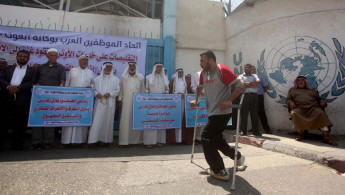Urgent call to fund Palestinian refugee agency
The UN secretary general has made an urgent call for help addressing UNRWA's $100 million funding shortfall, as the agency faces 'its most severe financial crisis ever'.
2 min read
Palestinians in Gaza protest against the funding crisis [Anadolu]
The UN Secretary General has made an urgent call to donors to help meet a $100 million financial deficit UNRWA, the UN agency assisting Palestinian refugees, faces in 2015.
Ban Ki-moon issued a statement yesterday asking donors for funding to ensure vital services received adequate and sustainable funding as soon as possible.
"The Secretary General emphasises that at a time when crises and human suffering are growing throughout the Middle East, it is imperative that UNRWA, a pillar of stability for a registered population of some 5 million Palestine refugees, is provided with the resources necessary to enable it to continue providing services including education for half a million Palestine refugee children," said the statement.
The agency is facing what it describes as its "most severe financial crisis ever".
It needs the additional funding to ensure around 700 schools and half a million students across the region can start the 2015-16 academic year on time.
UNRWA's Commissioner-General to the Secretary-General and the General Assembly issued a report explaining the implications of the deficit, and outlined steps needed to remedy the situation.
Funding has been unable to keep up with a growing refugee population and a sharp increase in the number of refugees due to the war in Syria and instability in Gaza and the West Bank.
In June 2015, UNRWA's office in Lebanon announced that from July the agency would be forced to suspend the $100 in monthly assistance it was giving for housing to Palestinian refugees from Syria living in Lebanon.
Created in 1949, the agency was established to provide direct relief for the 652,000 Palestinians that fled or were expelled from their homes when the state of Israel was created.
A failure to resolve the refugee issue has led to repeated extensions of UNRWA's mandate.
The agency now supports 5 million Palestinians who were made refugees by the 1948 and 1967 wars and their descendants living in Jordan, Lebanon, Syria, the West Bank and the Gaza Strip.
It provides education, health care and social services.
It is predominantly funded from voluntary contributions, mainly from donor states.
On 2 June, UN Secretary-General Ban Ki-moon said the agency exists "because of political failure".
"In the absence of a just and lasting solution to the plight of Palestinian refugees, UNRWA has become more than an agency," he said. "It is a lifeline."
Ban Ki-moon issued a statement yesterday asking donors for funding to ensure vital services received adequate and sustainable funding as soon as possible.
"The Secretary General emphasises that at a time when crises and human suffering are growing throughout the Middle East, it is imperative that UNRWA, a pillar of stability for a registered population of some 5 million Palestine refugees, is provided with the resources necessary to enable it to continue providing services including education for half a million Palestine refugee children," said the statement.
| The agency is facing what it describes as its 'most severe financial crisis ever'. |
It needs the additional funding to ensure around 700 schools and half a million students across the region can start the 2015-16 academic year on time.
UNRWA's Commissioner-General to the Secretary-General and the General Assembly issued a report explaining the implications of the deficit, and outlined steps needed to remedy the situation.
Funding has been unable to keep up with a growing refugee population and a sharp increase in the number of refugees due to the war in Syria and instability in Gaza and the West Bank.
In June 2015, UNRWA's office in Lebanon announced that from July the agency would be forced to suspend the $100 in monthly assistance it was giving for housing to Palestinian refugees from Syria living in Lebanon.
Created in 1949, the agency was established to provide direct relief for the 652,000 Palestinians that fled or were expelled from their homes when the state of Israel was created.
A failure to resolve the refugee issue has led to repeated extensions of UNRWA's mandate.
The agency now supports 5 million Palestinians who were made refugees by the 1948 and 1967 wars and their descendants living in Jordan, Lebanon, Syria, the West Bank and the Gaza Strip.
It provides education, health care and social services.
It is predominantly funded from voluntary contributions, mainly from donor states.
On 2 June, UN Secretary-General Ban Ki-moon said the agency exists "because of political failure".
"In the absence of a just and lasting solution to the plight of Palestinian refugees, UNRWA has become more than an agency," he said. "It is a lifeline."





 Follow the Middle East's top stories in English at The New Arab on Google News
Follow the Middle East's top stories in English at The New Arab on Google News
![The UAE is widely suspected of arming the RSF militia [Getty]](/sites/default/files/styles/image_330x185/public/2024-11/GettyImages-472529908.jpg?h=69f2b9d0&itok=Yauw3YTG)
![Netanyahu furiously denounced the ICC [Getty]](/sites/default/files/styles/image_330x185/public/2024-11/GettyImages-2169352575.jpg?h=199d8c1f&itok=-vRiruf5)
![Both Hamas and the Palestinian Authority welcomed the ICC arrest warrants [Getty]](/sites/default/files/styles/image_330x185/public/2024-11/GettyImages-2178351173.jpg?h=199d8c1f&itok=TV858iVg)